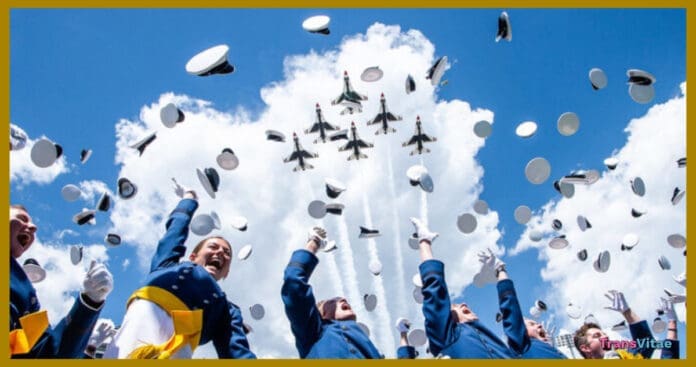On May 26, 2025, three transgender cadets at the United States Air Force Academy (USAFA) stood proudly among their classmates as they received their diplomas. But while their peers were commissioned as officers, these cadets were denied that honor under the Trump administration’s newly reinstated ban on transgender military service.
One of these cadets, Hunter Marquez, has been publicly identified. Marquez transitioned during his time at the Academy and has spoken out about the challenges he faced. The other two cadets have chosen to keep their identities private, likely out of concern for safety and potential harassment. Their decision underscores the very real risks that transgender individuals continue to face in military and civilian life alike.
Despite completing the rigorous academic and military programs at the Academy, these transgender cadets were not allowed to commission into the Air Force or Space Force alongside their peers. Instead, they were placed on administrative absence, their futures abruptly stalled. According to an Academy spokesperson, these graduates are being encouraged to apply for voluntary separation by June 6. Those who choose to do so will not face repayment obligations or military service commitments. If they do not voluntarily separate, the Academy says they will face involuntary separation proceedings.
This policy shift follows a May 6 Supreme Court decision that allowed the Trump administration to immediately enforce its ban on transgender service members. The ban, detailed in Executive Order 14183, targets anyone with a current diagnosis, a history of, or symptoms consistent with gender dysphoria. Secretary of Defense Pete Hegseth’s remarks about eliminating pronoun use and so-called wokeness in the military have only fueled the sense of injustice among transgender service members and their allies.
The impact of this ban goes far beyond the Air Force Academy. An estimated 1,000 active-duty transgender service members are now facing immediate separation under this policy. Legal experts and advocates have called the ban discriminatory and unsupported by evidence. Judge Benjamin Settle, who had previously blocked the policy, described the government’s arguments as lacking justification and failing to prove that excluding transgender individuals improves military readiness.
For Marquez and his fellow cadets, the decision to deny them commissions feels like a betrayal of their years of dedication and their willingness to serve. It is not a reflection of their performance or their ability to meet military standards. Instead, it is a rejection based solely on their gender identity.
As the legal battles continue, these cadets’ resilience and strength stand as a testament to their commitment and to the ongoing struggle for equality. Their stories highlight the continued challenges that transgender people face in the armed forces and in society. And they serve as a powerful reminder that the fight for fairness, dignity, and equal opportunity is far from over.


